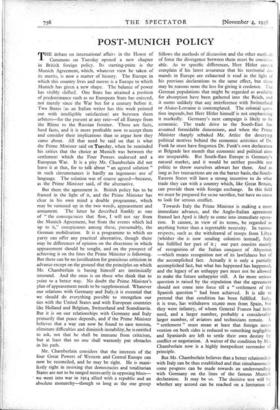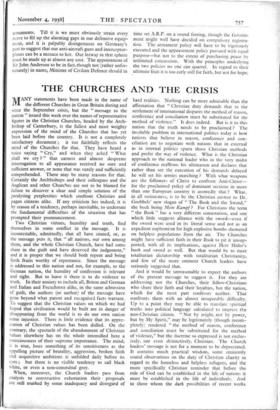POST-MUNICH POLICY
THE debate on international affairs in the House of Commons on Tuesday opened a new chapter in British foreign policy. Its starting-p6int is the Munich Agreement, which, whatever view be taken of its merits, is now a matter of history. The Europe in which this country lives and moves is a Europe to which Munich has given a new shape. The balance of power has visibly shifted. One State has attained a position of predominance such as no European State has enjoyed, not merely since the War but for a century before it. Two States (as an Italian writer has this week pointed out with intelligible satisfaction) are between them arbiters—for the present at any rate—of all Europe from the 'Rhine to the Russian frontier. Those are facts, hard facts, and it is more profitable now to accept them and consider their implications than to argue how they came about. All that need be said on that is what the Prime Minister said on Tuesday, when he reminded his critics that the choice at Munich was between the settlement which the Four Powers endorsed and a European War. It is a pity Mr. Chamberlain did not leave it at that, for to talk about " an agreed solution " in such circumstances is hardly an ingenuous use of language. The solution was of course agreed—because, as the Prime Minister said, of the alternative.
But there the agreement is. British policy has to be framed in the light of it, and the Prime Minister has clear in his own mind a double programme, which may be summed up in the two words, appeasement and armament. The latter he described frankly as one of " the consequences that flow, I will not say from the Munich Agreement, but from the events which led up to it," conspicuous among these, presumably, the German mobilisation. It is a programme to which no party can offer any practical alternative, though there may be differences of opinion on the directions in which appeasement should be sought, and on the prospect of achieving it on the lines the Prime Minister is following. But there can be no justification for gratuitous criticism in advance except on the ground that the principles on which Mr. Chamberlain is basing himself are intrinsically unsound. And the onus is on those who think that to point to a better way. No doubt the Prime Minister's plan of appeasement needs to be supplemented. Whatever our relations with Germany and Italy, it is essential that we should do everything possible to strengthen our ties with the United States and with European countries like Holland and Belgium, Switzerland and Scandinavia. But it is on our relationships with Germany and Italy primarily that peace depends, and if the Prime Minister believes that a way can now be found to ease tension, eliminate difficulties and diminish instability, he is entitled to ask, not that he shall be immune from criticism, but at least that no one shall wantonly put obstacles in his path.
Mr. Chamberlain considers that the interests of the four Great Powers of Western and Central Europe can now be reconciled, and he may be right. He is mani- festly right in insisting that democracies and totalitarian States are not to be ranged necessarily in opposing blocs- ' we went into war in 1914 allied with a republic and an absolute monarchy—though so long as the one group follows the methods of discussion and the other methods of force the divergence between them must, be consider- able. As to specific differences, Herr Hitler cannot complain if his latest assurance that his territorial de- mands in Europe are exhausted is read in the light of his previous declarations to the same effect, but there may be reasons none the less for giving it credence. The German populations that might be regarded as available for absorption have been gathered into the Reich, and it seems unlikely that any interference with Switzerland or Alsice-Lortaine is contemplated. The colonial ques- tiOn impends, but Herr Hitler himself is not emphasising it markedly. Germany's next campaign is likely to be economic. The trade drive to the South-East has assumed formidable dimensions, and when the Prime Minister sharply rebuked Mr. Attlee for descrying political motives behind the economic activities of Dr. Funk he must have forgotten Dr. Funk's own declaration at Belgrade last month that economic and political aims are inseparable. But South-East Europe is Germany's natural market, and it would be neither possible nor politic to throw ourselves athwart her there. And as long as her transactions are on the barter basis, the South- Eastern States will have a strong incentive to do what trade they can with a country which, like Great Britain, can provide them with foreign exchange. In this field we must be prepared for some sacrifice, but have no cause to look for serious conflict.
Towards Italy the Prime Minister is making a more immediate advance, and the Anglo-Italian agreement framed last April is likely to come into immediate opera- tion. It cannot, in view of its terms, be regarded as anything better than a regrettable necessity. In various respects, such as the withdrawal of troops from Libya (whither she is now sending colonists instead), Italy has fulfilled her part of it ; our part consists mainly of recognition of the Italian conquest of Abyssinia —which means recognition not of its lawfulness but of the accomplished fact. Actually it is only a partially accomplished fact, but what has happened has happened, and the legacy of an unhappy past must not be allowed to make the future unhappier still. A far more serious question is raised by the . stipulation that the agreement should not come into force till a " settlement of the Spanish question " had been achieved. It is idle to pretend that that condition has been fulfilled. Italy, it is true, has withdrawn io,000 men from Spain, but they were infantry, of whom General Franco had little need, and a larger number, probably a considerably larger number, of aviators and technicians remain. A " settlement " must mean at least that foreign inter- vention on both sides is reduced to something negligible and Spaniards are left to settle their own destiny by conflict or negotiation. A waiver of the condition by Mr. Chamberlain now is a highly inexpedient surrender of principle.
But Mr. Chamberlain believes that a better relationship with Italy can be thus established and that simultaneously some progress can be made towards an understanding with Germany on the lines of the famous Munich declaration. It may be so. The decisive test will be whether any accord can be reached on a limitation of armaments. Till it is we must obviously strain every nerve to fill up the alarming gaps in our defensive equip-. meat, and it is palpably disingenuous on Germany's part to suggest that our anti-aircraft guns and interceptor- planes can be a menace-to her. Our leeway in that sphere must be made up at almost any cost. The appointment of Sir John Anderson to be in fact, though not (rather unfor- tunately) in name, Minister of Civilian Defence should in time set A.R.P. on a sound footing, though the Govern- ment might well have decided on compulsory registra- tion. The armament policy will have to be vigorously executed and the appeasement policy pursued with equal purpose—but not to the extent of purchasing peace by unlimited concessions. With the principles underlying the two policies no one can quarrel. In regard to their ultimate fruit it is too early still for faith, but not for hope.











































 Previous page
Previous page